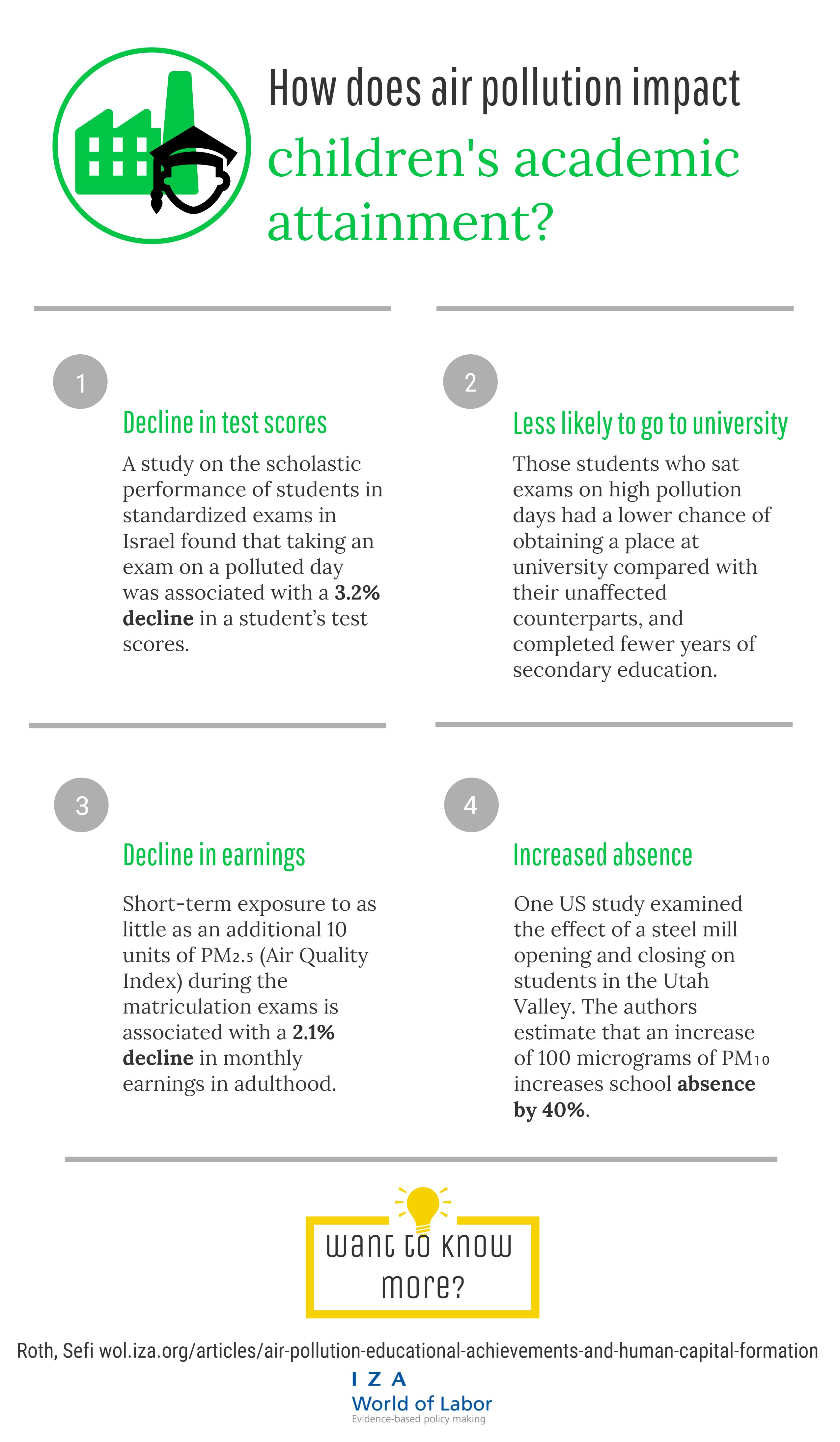NEW REPORT: Exposure to air pollution adversely affects educational outcomes

A new IZA World of Labor report finds that air pollution, in addition to its well-known link to health-related problems, affects scholastic achievement and human capital formation.
Recent data from the World Health Organization (WHO) show that ambient air pollution has risen in hundreds of already blighted urban areas across the globe. The well-known adverse human health consequences from exposure to pollution have led the WHO to describe the situation as a “public health emergency.” However, according to recent research summarized by the economist Sefi Roth (LSE), air pollution—even in relatively low doses—also affects educational outcomes across several distinct age groups and varying lengths of exposure.
According to Roth, research has identified several potential mechanisms that can link air pollution to educational outcomes. First, scholastic achievement may be affected directly by deterioration in oxygen quality induced by air pollution, as the brain consumes a large fraction of the oxygen needed by the body. Studies also suggest that exposure to air pollution affects brain development during childhood and fetal development. Furthermore, air pollution exposure may cause irritation of the eyes, nose, and throat, as well as asthma attacks, headaches, dizziness, and fatigue, which can all clearly affect student achievement. Finally, pollution may increase school absences, either due to pollution-related illness or parental decisions to keep children at home to avoid pollution exposure.
A UK study, for example, examining the impact of fetal exposure to the severe air pollution episode that hit London for five days in December 1952 suggests that these individuals were 3% less likely to have a high school qualification (A-level) compared to their counterparts who were not affected by the smog. Another study Roth mentions examines the effect of fine particulate matter (PM2.5) on scholastic performance of students in standardized exams in Israel. The results demonstrate that taking an exam on a polluted day was associated with a 3.2% decline in a student’s test scores, with boys and students from low socio-economic backgrounds being most affected. Importantly, the study finds that this effect is evident at pollution levels below current environmental standards.
Furthermore students who sat exams on high pollution days had a lower chance of obtaining a place at university compared with their counterparts, and completed fewer years of postsecondary education. The study also finds that short-term exposure to as little as an additional 10 units of PM2.5 (Air Quality Index) during matriculation exams is associated with a 2.1% decline in monthly earnings in adulthood.
These findings imply that a narrow focus on traditional health outcomes, such as morbidity and mortality, may understate the true benefit of reducing pollution. Furthermore, the empirical evidence suggests that effects on educational outcomes exist already in pollution levels well below current environmental standards. Therefore, there is a need for tighter environmental policies compared to current regulations. Finally Roth suggests that improving air quality may also improve social mobility, as evidence suggests that air pollution affects educational outcomes unevenly across the income distribution.
Please credit IZA World of Labor should you refer to or cite from this article.
You can find the latest research relating to the subject of environment on the IZA World of Labor Environmental Regulation and the Labor Market key topic page.
Media Contact:
Please contact Francesca Geach for more information or for author interviews: francesca.geach@bloomsbury.com or +44 (0)20 7462 9204
Notes for editors:
IZA World of Labor (https://wol.iza.org) is a global, freely available online resource that provides policy makers, academics, journalists, and researchers, with clear, concise and evidence-based knowledge on labor economics issues worldwide.
The site offers relevant and succinct information on topics including diversity, migration, minimum wage, youth unemployment, employment protection, development, education, gender balance, labor mobility and flexibility among others.
Established in 1998, the Institute of Labor Economics (www.iza.org) is an independent economic research institute focused on the analysis of global labor markets. Based in Bonn, it operates an international network of about 1,500 economists and researchers spanning more than 45 countries.
PDF version